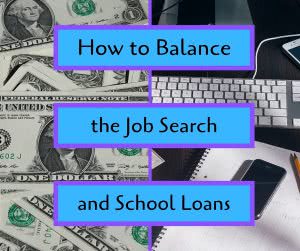 For many college graduates, it is the time immediately after the graduation ceremony that the ultimate “juggling act” begins. This is the time in which they must try to find a job while also paying down their school loans. If you are one of the thousands of recent college graduates who need to learn this amazing feat, keep reading for tips and suggestions.
For many college graduates, it is the time immediately after the graduation ceremony that the ultimate “juggling act” begins. This is the time in which they must try to find a job while also paying down their school loans. If you are one of the thousands of recent college graduates who need to learn this amazing feat, keep reading for tips and suggestions.
Handling the Job Search
Some people are able to find gainful employment prior to graduation. Others, however, may continue searching for something within their field of study. For some grads, that search may take anywhere from a month to a year or more.
With student loan repayments on the horizon, it’s vital to get a job to pay off your debts. That is why you should take full advantage of your student loan grace period. For most loans, you won’t have to start making repayments until six months after you graduate. Use that time to find and secure a job. That way, when the repayment bills start coming in, you have some financial footing.
The key is not to give up.
Handling Your Debt
If you weren’t one of those lucky people who received a full ride, you’re more than aware that your student loans have to be repaid. After your grace period ends, those payments should be on time, every time.
Well, that’s the ideal scenario. But what if you’re already struggling to meet your monthly expenses and just cannot afford the monthly payments? What if your first post-grad job doesn’t pay very well, or you haven’t been able to find a job yet?
First, contact your student loan provider immediately. Explain your situation. Lending institutions are far more likely to work with you to find a solution if you notify them of any dire circumstances. Like unemployment, job loss, or a major change in income status.

What if Your School Loan Debt is Overwhelming?
Say you haven’t found a job. Or your entry-level position doesn’t pay much. Between housing bills, food, and other living expenses, student loan payments are just pushing you over the edge.
You’ve got options.
- Refinancing:
Refinancing a student loan is like replacing your current loan with a new one—with different rates and terms. You could potentially lower your interest rate, which will lower the overall cost of the loan. Or you could reduce the monthly amount you pay. While that may extend the term of your loan, it will make monthly payments more manageable.
- Opt for a different repayment plan:
A standard repayment plan might not be the best for you. While consistent, it isn’t always flexible. Instead, consider a Graduated plan, or an Income-Based plan. Graduated will start with lower monthly payment amounts that raise over time—hopefully in tandem with the amount of money you make. An income-based plan is a payment capped at a fixed percent of your monthly income.
Preventative Measures
If you’re still in school, you’ve got time to get a head start. If possible, start repaying student loans while in school—either with monthly repayments or interest-only payments. This will reduce the overall cost of your loan, and how long you have it.
On the job front, start searching for opportunities before you graduate. Network with your faculty, employers, or internship co-workers. Send out resumes, browse job forums. Don’t wait for your grace period to get started.
Good luck!
Use College Raptor to discover personalized college matches, cost estimates, acceptance odds, and potential financial aid for schools around the US—for FREE!


